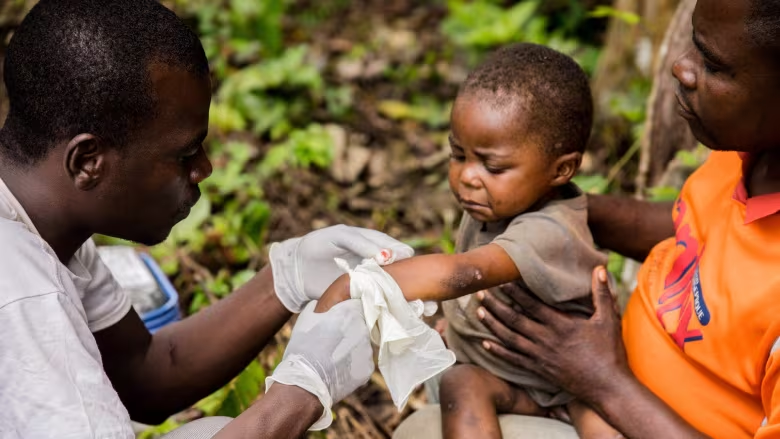UNICEF today announced that it has issued an emergency tender for the procurement of mpox vaccines. Vaccines can play a critical role in containing the mpox outbreak which was declared a public health emergency by both the Africa Centres for Disease Control and Prevention (Africa CDC) and the World Health Organization (WHO).
The UNICEF tender is issued to help secure mpox vaccines for the hardest hit countries in collaboration with Africa CDC, Gavi, the Vaccine Alliance, WHO, the Pan American Health Organization and other partners. This collaboration to increase access and timely allocation also includes working together to facilitate donations of vaccines from existing stockpiles in high-income countries with the aim of containing the ongoing transmission of mpox.
Under the emergency tender, UNICEF will set up conditional supply agreements with vaccine manufacturers. This will enable UNICEF to purchase and ship vaccines without delay once countries and partners have secured financing, confirmed demand and readiness, and the regulatory requirements for accepting the vaccines are in place. WHO is currently reviewing the information submitted by manufacturers on 23 August and is expected to complete its review for Emergency Use Listing by mid-September.
More than 18,000 suspected cases of mpox, including 629 deaths, have been reported this year in the Democratic Republic of the Congo which is at the epicentre of the crisis. Four out of five deaths have been in children.
“Addressing the current mpox vaccine shortage and delivering vaccines to communities who need them now is of paramount importance. There is also a pressing need for a universal and transparent allocation mechanism to ensure equitable access to mpox vaccines,” said Director of UNICEF Supply Division Leila Pakkala.
“As we confront the ongoing Mpox outbreak, the timely procurement and distribution of vaccines is crucial to protecting the most vulnerable populations, particularly in the hardest-hit regions. This emergency tender is a critical step forward in our collective effort to control the spread of this disease. Africa CDC is committed to ensuring that vaccines are allocated swiftly and equitably across the continent, in partnership with UNICEF, Gavi, WHO, and other key stakeholders. Our unified response is essential to curbing the impact of this public health emergency and safeguarding the health and well-being of our communities,” said Dr. Jean Kaseya, Director General of Africa CDC.
“With several partners working on securing access to supply, today’s announcement represents an important step in this emergency, enabling UNICEF to purchase and deliver vaccines after Gavi and other partners make funding available and sign purchase or donation agreements with manufacturers for the most immediate dose needs,” said Dr Derrick Sim, interim Chief Vaccine Programmes and Markets Officer at Gavi, the Vaccine Alliance. “Securing access to supply and financing, delivering doses, and in parallel ensuring countries are ready to administer them, are all vital actions that need to be conducted rapidly but thoroughly, and in a coordinated manner. We welcome this tender as another positive step our Alliance and Africa CDC are taking in this response.”
“A swift, coordinated, and equitable response is critical to controlling the current mpox emergency and preventing future ones,” said Dr Maria Van Kerkhove, WHO incident manager for the global mpox response and acting Director for Epidemic and Pandemic Preparedness and Prevention. “All of us must act decisively now or risk allowing mpox to spread further and become an even greater global threat. In an interconnected world, the fight against mpox – as with other infectious diseases and health threats — cannot be waged alone., WHO is glad to partner with UNICEF, Gavi, Africa CDC, other partners and affected countries to get life-saving tools to people in need.”
The emergency tender is designed to secure immediate access to available mpox vaccines as well as to expand production. Depending on demand, production capacity of manufacturers and funding, agreements for up to 12 million doses through 2025 can be put in place.
Vaccines are one of several tools used to interrupt transmission and to protect children and communities against mpox. Africa CDC, Gavi, UNICEF, WHO, and partners are also prioritizing infection prevention and control, and risk communication and community engagement. As part of this, UNICEF is deploying personal protection equipment, diagnostic tests, medical treatment kits, hygiene supplies and tents to countries at the forefront of the crisis. These supplies support a host of medical countermeasures such as treatment, case isolation and surveillance.
UNICEF is the world’s largest single vaccine buyer, procuring more than 2 billion doses of vaccines annually for routine child immunization and outbreak response on behalf of nearly 100 countries.



